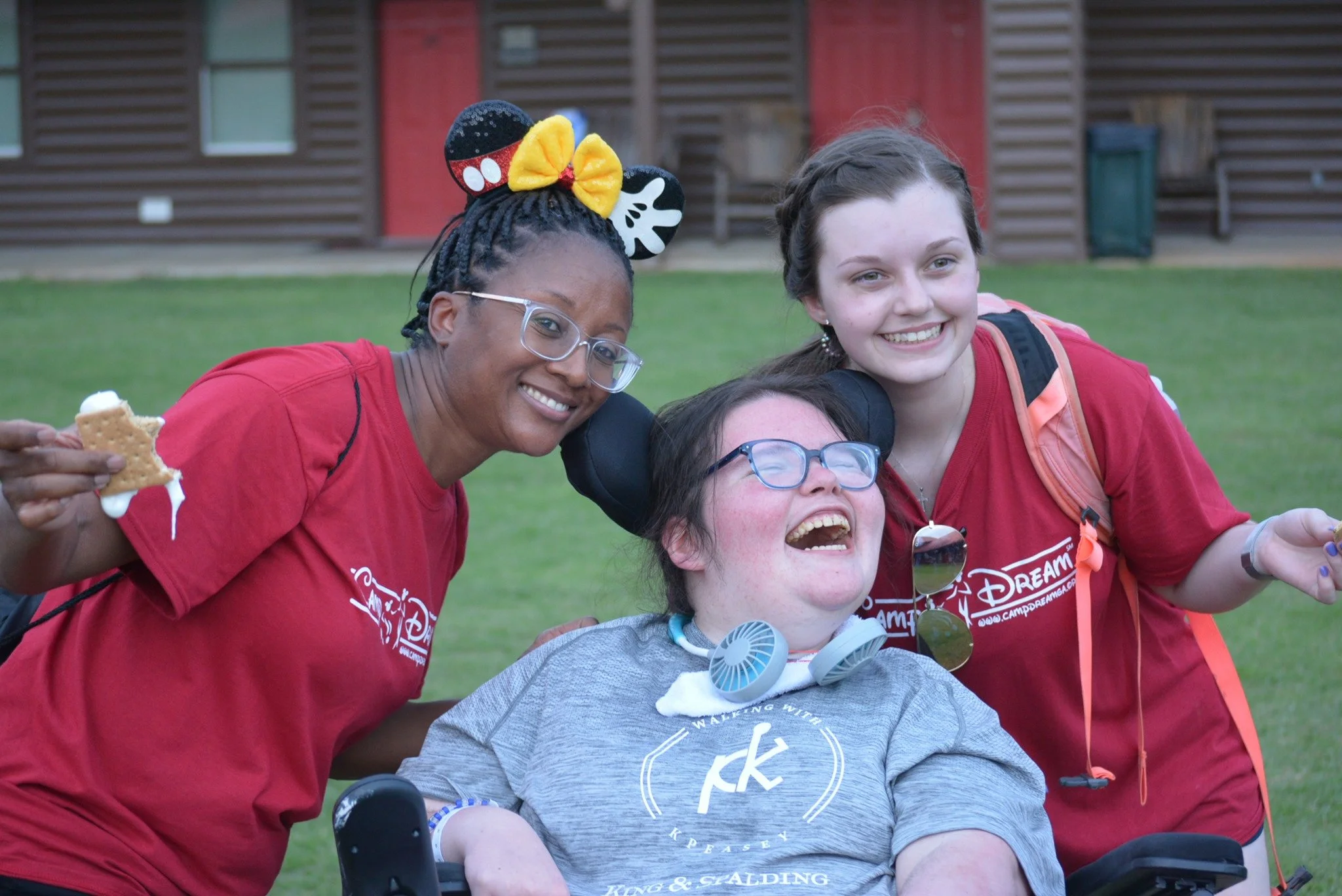Our Campers at our Camp Dream Summer Camp in Georgia are experts in smiling. Their smiles light up the world of everyone around them, radiating positivity and hope. Inspired by their unwavering spirit, we embarked on a journey to explore the science behind smiling. This exploration unveils how such a simple gesture can profoundly impact our mental and physical health, social connections, and overall life satisfaction.
We delve into the biological mechanisms a genuine smile triggers, revealing its power to release happiness-inducing hormones and reduce stress. Beyond individual benefits, smiling fosters social bonds. It enhances interactions at work, home, and in sports, underscoring its remarkable capacity to transform challenges into opportunities for growth and connection across all walks of life.
THE SCIENCE OF SMILING
The science behind a smile reveals an intricate connection between facial expressions and brain activity. When we smile genuinely, our brain releases a potent combination of hormones: dopamine, endorphins, and serotonin. These chemicals are nature's way of alleviating stress and enhancing our mood, effectively diminishing physical discomfort and elevating our sense of happiness. In a fascinating demonstration of this effect, research cited by "Psychological Science" discovered that the simple act of smiling can boost an individual's likelihood of feeling happier by 27%, emphasizing the profound effect a smile can have.
The benefits of smiling extend into challenging situations, notably reducing the body's stress response. This reduction isn't merely a psychological phenomenon but a physical one, indicating that smiles serve as more than just a social signal; they are a powerful mechanism for coping with life's demands. Through smiling, we engage an inherent tool designed to bolster our well-being and fortify our resilience, as detailed in insights from "Psychological Science." This underlines a smile's critical role in maintaining our mental and physical health amidst daily pressures.
SMILING AND SOCIAL CONNECTIONS
Smiling serves as a foundational element in forging and strengthening social bonds. Research highlights that individuals who often smile are perceived as more approachable, competent, and trustworthy. This perception is vital in social contexts, where first impressions can shape relationships and interactions. It's no surprise that a smile can catalyze social connectivity, opening doors to meaningful conversations and interactions.
Beyond mere perceptions, smiling facilitates a sense of belonging and community among individuals. When we smile, we instinctively encourage those around us to mirror our behavior, creating a cycle of positive emotional exchange. This shared experience enhances our social relationships and contributes to a supportive and empathetic environment. In essence, smiling acts as a bridge between individuals, fostering a sense of unity and mutual understanding.
THE HEALING POWER OF SMILING
Smiling is more than a reflex; it's a powerful tool for mental well-being. Smiling, even briefly, acts as a catalyst for releasing neurotransmitters that combat stress and promote feelings of joy. This natural decrease in stress hormones like cortisol lowers anxiety levels and uplifts our mood. The transformative effect of a simple smile on our mental landscape cannot be overstated; serving as a bridge to greater happiness and contentment.
The "Journal of Neuropsychology" underscores the profound impact smiling has on our neurological pathways. Smiling can significantly enhance our mental health by activating regions of the brain associated with happiness and positive feelings. This activation demonstrates the tangible benefits of smiling on our mood and its role as a therapeutic gesture, enriching our day-to-day lives with a sense of well-being and resilience.
SMILING AND PHYSICAL HEALTH
The act of smiling extends far beyond merely enhancing mood; it has the potential to contribute positively to our lifespan. Insights from the field of cardiology, as detailed in a study published by "Psychosomatic Medicine," illuminate a significant link between the frequency of genuine smiles and the state of one's heart health. This research suggests that smiling can naturally lower heart rate and blood pressure during stressful situations, serving as a form of protection for our cardiovascular health.
This natural gesture of smiling goes beyond just being a source of happiness; it emerges as a vital player in maintaining our long-term physical health. The study implies that embracing the simple habit of smiling could effortlessly support heart wellness, highlighting a deep connection between how we express our emotions and the fundamental operations of our bodily systems.
ENCOURAGING SMILES AMONG CHILDREN
The impact of smiling on children, particularly those facing moderate to severe physical or developmental challenges, is underscored by research in the "Journal of Pediatric Psychology." Engaging children in activities and interactions that prompt smiles not only lifts their mood but also profoundly affects their overall sense of well-being. This simple yet deeply impactful act serves as a key to unlocking moments of joy, significantly enhancing their daily lives.
Each smile these children share represents a step towards a more optimistic and enriched quality of life. According to findings in the "Journal of Pediatric Psychology," these instances of genuine happiness play a crucial role in boosting their morale, showcasing the transformative potential of smiling in easing the everyday hurdles they encounter. Thus, encouraging smiles in these young lives is not merely a gesture of happiness but an essential element of their development and growth, emphasizing the importance of integrating such positive experiences into their care and support structures.
THE IMPACT ON DEVELOPMENTAL CHALLENGES
According to some findings, as explored in the work of researchers associated with the "Journal of Developmental and Physical Disabilities," a smile can play a pivotal role in children encountering developmental challenges. This research suggests that positive facial expressions, like smiles, could potentially enhance concentration and foster an environment more apt for engaging with and retaining new information. While inconclusive, these insights propose that such simple expressions might significantly influence their educational paths.
The same studies indicate that smiling might serve as a bridge in social scenarios, promoting valuable interactions with others. These interpersonal connections are not merely advantageous but are seen as crucial components of the developmental process, potentially enriching a child's social skills and emotional understanding. Thus, smiling is posited to possess the capacity to turn developmental obstacles into gateways for meaningful growth and social engagement, highlighting its importance in fostering a supportive learning environment.
SMILING AS THERAPY
Research indicates that strategies that nurture smiling could be significant in therapeutic contexts. According to a study in the "American Journal of Play," therapists incorporate methods to prompt smiles and laughter, potentially alleviating stress and enhancing pain endurance in children potentially. This approach underscores the value of positive emotional expressions in treatment.
The same source suggests these techniques might be crucial in shaping children's perspectives toward therapy, making sessions seem more welcoming and less daunting. By infusing therapy with elements that spark joy, such as smiling and laughter, there's a suggestion that the therapeutic journey could be more engaging and beneficial for young participants.
THE RIPPLE EFFECT OF A SMILE
The ripple effect of a smile carries far-reaching benefits that traverse various aspects of life, touching the individual who is smiling and those around them. For instance, a smile can significantly influence workplace dynamics in professional settings. According to a study published in the "Journal of Applied Psychology," employees who frequently smile are perceived as more competent and are more likely to receive promotions, indicating the power a simple smile holds in fostering career advancement.
The impact of smiling extends into personal and family life, profoundly affecting parents managing household stresses. Research from the "American Journal of Orthopsychiatry" suggests that parents who maintain a positive demeanor, characterized by smiling, report lower levels of parenting stress and higher satisfaction in their roles. This underscores how a smile can be crucial for nurturing a positive home environment.
In the realm of sports and athletics, the benefits of smiling are equally impressive. A study by the International Journal of Health, Physical Education and Computer Science in Sports found that athletes who smile during challenging moments in training or competition experience reduced perceived effort levels by up to 22%, enhancing performance and endurance. These examples collectively illustrate how the simple act of smiling can significantly improve our interactions at work, create a more harmonious home life, and boost athletic performance, showcasing the universal power of a smile across diverse spheres of life.
A simple smile has the power to significantly improve professional success, reduce stress for parents, and increase athletes' performance and endurance, showcasing its profound influence across work, family life, and sports. This universal gesture of happiness transcends individual benefits, enhancing the well-being and achievements of those around the smiler.
THE TRANSFORMATIVE SMILE
As our exploration concludes, it's clear that smiling is far more than a mere expression of the moment; it's a universal language of positivity, resilience, and connection. From enhancing mental and physical health to fostering deeper social connections and improving life's various challenges, the power of a smile touches all who give and receive it. It serves as a reminder that something as simple as a smile can harbor immense potential to transform lives and perspectives across every corner of our existence.
The journey from understanding the physiological basis of smiling to witnessing its profound effects on personal, professional, and developmental levels emphasizes the smile's indispensable role in human interaction and well-being. Whether it's reducing stress, connecting with others, or facing life's hurdles with a positive outlook, the influence of a smile extends far beyond the surface, proving to be an invaluable tool in navigating the complexities of life. Let us carry this knowledge forward, embracing the power of our smiles to light up the world around us, just as our campers do daily.











